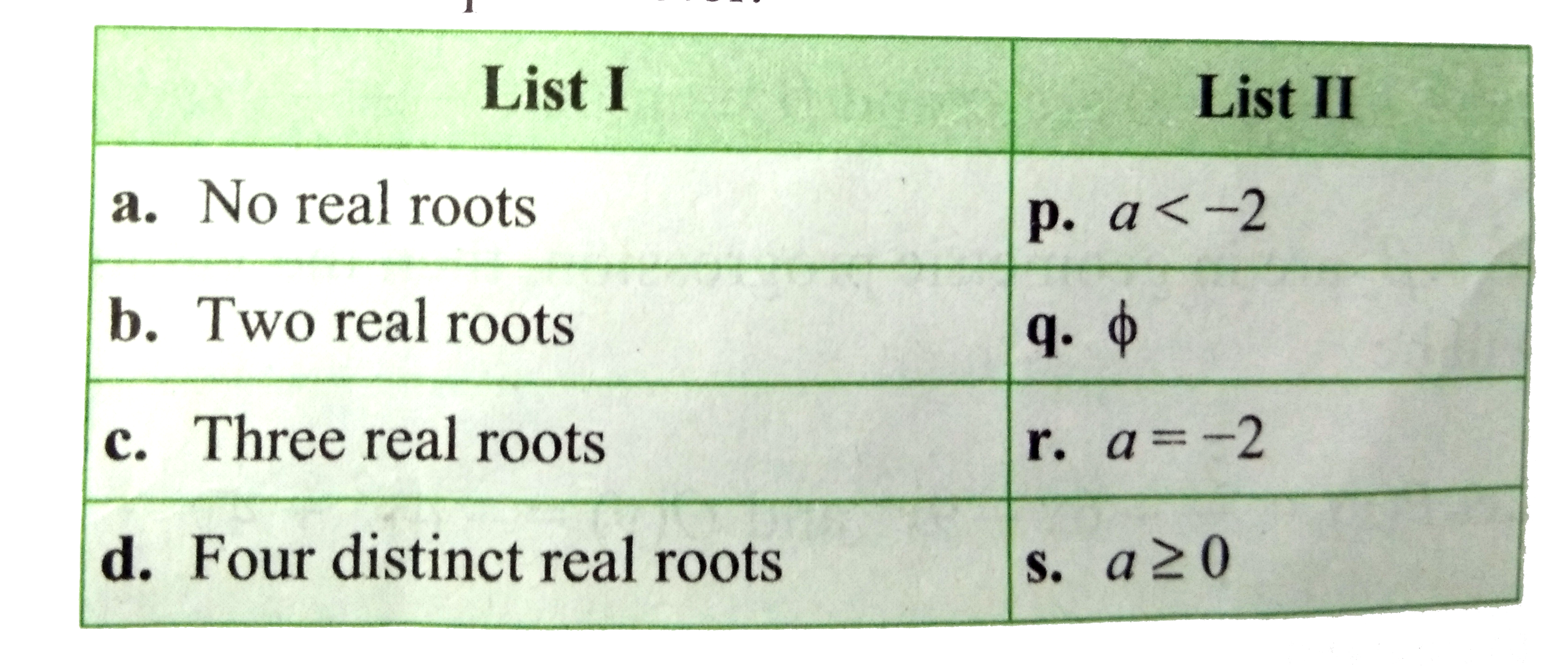If every pair of equations x2+ax+bc=0,x2+bx+ca=0 and x2+cx+ab=0 has a common root then their sum isSolution in Bengali
the sum of the three common roots is −(1/2)(a+b+c)
the sum of the three common roots is 2(a+b+c)
one of the values of the product of the three common
roots is abc
the product of the three common roots is a2b2c2
The correct Answer is:1,3
Since each pair has common root, let the roots be α,β for
Eq(1), β,γ for Eq. (2) and γ,α for Eq (3). Thereofore,
α+β=−a,αβ=bc
β+γ=−b,βγ=ca
γ+α=−C,γα=ab
Adding, we get
2(α+β+γ)=−(a+b+c)
⇒α+β+γ=−12(a+b+c)
Also by multiplying product of roots , we have
α2β2γ2=a2b2c2orαβγ=abc .
Topper's Solved these Questions
- BOOK - CENGAGE PUBLICATIONCHAPTER - THEORY OF EQUATIONSEXERCISE - Linked Comprechension Type37videos
THEORY OF EQUATIONS
- BOOK - CENGAGE PUBLICATIONCHAPTER - THEORY OF EQUATIONSEXERCISE - MATRIX MATCH TYPE6videos
THEORY OF EQUATIONS
- BOOK - CENGAGE PUBLICATIONCHAPTER - THEORY OF EQUATIONSEXERCISE - Single Correct Answer Type : Exercise89videos
THEORY OF EQUATIONS
- BOOK - CENGAGE PUBLICATIONCHAPTER - STRAIGHT LINESEXERCISE - ARCHIVES (NUMERICAL VALUE TYPE)1videos
STRAIGHT LINES
- BOOK - CENGAGE PUBLICATIONCHAPTER - THREE DIMENSIONAL GEOMETRYEXERCISE - All Questions291videos
THREE DIMENSIONAL GEOMETRY
Similar Questions
Consider an unknow polynomial which divided by (x−3) and (x−4) leaves remainder 2 and 1, respectively. Let R(x) be the remainder when this polynomial is divided by (x−3)(x−4).
If equations R(x)=x2+ax+1 has two distint real roots, then exhaustive values of a are.06:05View SolutionMatch the following for the equation x2+a|x|+1=0 where, a is a parameter.
 01:43View Solution
01:43View SolutionThe value of expression x4−8x3+18x2−8x+2 when x=2+√3
06:22View SolutionFor a point P in the plane, let d1(P)andd2(P) be the distances of the point P from the lines x−y=0andx+y=0 respectively. The area of the region R consisting of all points P lying in the first quadrant of the plane and satisfying 2≤d1(P)+d2(P)≤4, is
02:24View SolutionFind the angle between the line whose direction cosines are given by l+m+n=0andl2+m2−n2=0.
06:50View SolutionIf x2+ax+bc=0andx2+bx+ca=0(a≠b) have a common root, then prove that their other roots satisfy the equation x2+cx+ab=0.
05:40View Solutionif each pair of the equation x2+ax+b=0,x2+bx+c=0andx2+cx+a=0 has common root, then product of all common root is
07:45View SolutionIf the quadratic equations x^(2)+bx+ca=0&x^(2)+cx+ab=0 (where a!=0 ) have a common root.prove that the equation containing their other root is x^(2)+ax+bc=0
04:19View SolutionIf every pair of equations x^(2)+ax+bc=0,x^(2)+bx+ca=0 and x^(2)+cx+ab=0 has a common root then their sum is
View SolutionProve that , if the equations x2+bx+ca=0 and x2+cx+ab=0 have only non-zero common root then their other roots satisfy the equation t2+at+bc=0.
03:03View SolutionIf the equation x2+bx+ca=0 and x2+cx+ab=0 have a common root and b≠c, then prove that their roots will satisfy the equation x2+ax+bc=0.
01:45View SolutionIf x2+bx+ca=0,x2+cx+ab=0 have a common root then their other are the roots of the equation
06:08View SolutionIf every pair from among the equations
x2+ax+bc=0,x2+bx+ca=0,x2+cx+ab=0 has a common root, then the sum of the three common roots is03:57View SolutionIf the equations x^(2)-ax+bc=0 and x^(2)+bx+ca=0 have a common root, then a + b + c =
05:03View SolutionIf the equation x^2+ax+bc=0" and " x^2-bx+ca=0 have a common root, then a+b+c =
03:53View SolutionIf every pair of equations x2+ax+bc=0,x2+bx+ca=0 and x2+cx+ab=0 has a common root then their sum is
01:42View Solution

